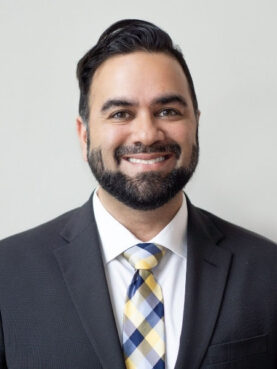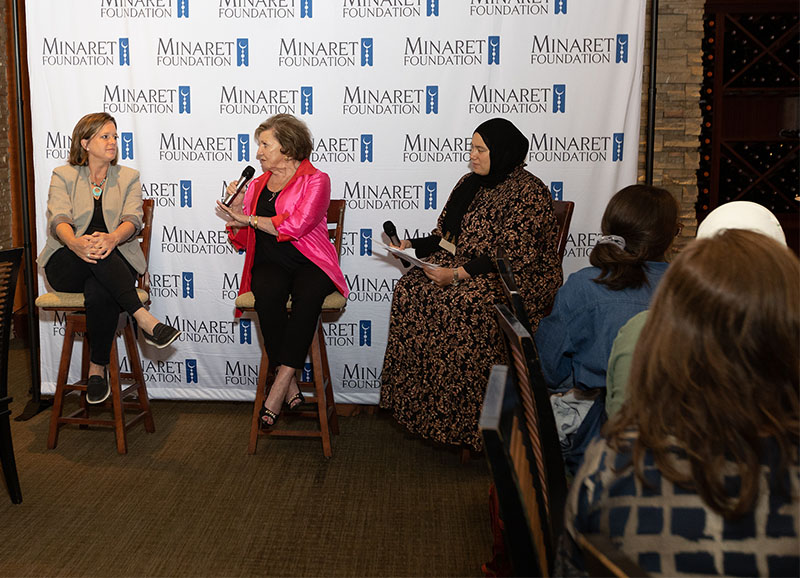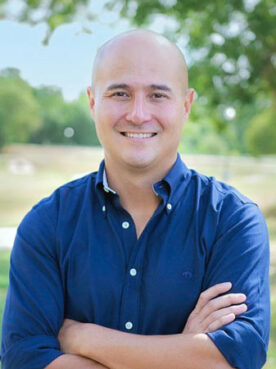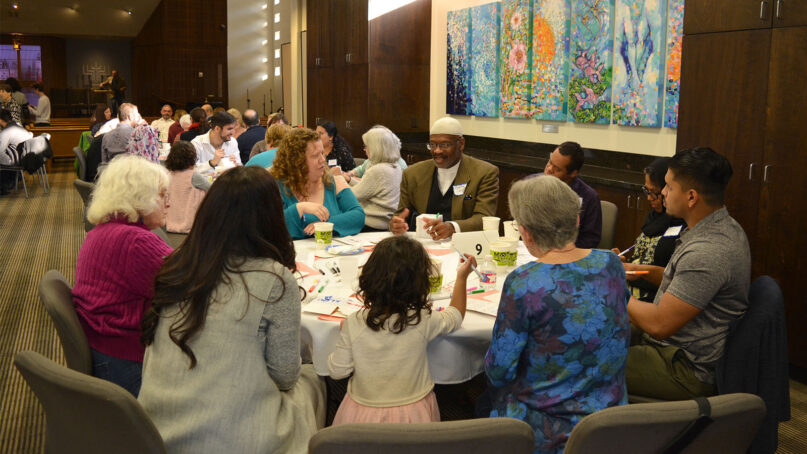HOUSTON (RNS) — More than a dozen years ago, Shariq Abdul Ghani, a local Muslim leader, and Rabbi Steve Gross, of the Houston Congregation for Reform Judaism, decided to make the best of one of the most uneventful days of the whole year for their respective communities. Their goal was simple — to bring together their communities for what became known as “Muslim-Jewish Christmas.”
“I realized they have nothing to do on Christmas,” Ghani told Religion News Service in a recent interview. “We realized we have nothing to do on Christmas, so why don’t we just get our communities together and see what happens,” he said.
The event has grown into an annual ritual, as each Christmas Eve, Muslims and Jews share meals and have difficult conversations about religiously motivated hate, interfaith solidarity, mercy and forgiveness in the Holy Scriptures and contentious topics in interfaith work, including the conflict between Israel and Palestine.
“Every year we switch between a mosque and synagogue, and one year we rented out the Museum of Natural Science. Everyone is off, so you have no excuse, so it’s easy to pack the house.”
That same year, 2010, Ghani, a Houston native, founded the Minaret Foundation to raise awareness of Islam in one of the most religiously diverse cities in America — Houston, Texas. Naming his organization for the towers attached to traditional mosques from which Muslims are called to prayer, he wanted to change mistrust facing the Muslim community at the height of the “War on Terror.”
His approach was to collaborate with leaders of other faiths and find partners in both political parties to find common ground. And he would work on issues confronting citizens across all backgrounds: child-welfare, food security and religious freedom.

Shariq Abdul Ghani. Photo courtesy of Minaret Foundation
“When we started, the goal was to bring people together by building relationships, breaking bread, by having dialogue and discussions, breaking down barriers through frank discussion,” said Ghani. Instead of talking about “the Muslims,” he said, he wanted the conversation to be about “Muslims — our neighbors, our fellow Americans.”
The Minaret Foundation began holding speaking engagements, community service projects and fellowship events at other houses of worship and schools around the Houston metro area. “We would always start our programs off by saying, ‘You can never offend us, you can never hurt us, we want you to be able to ask the questions you want to ask, because that’s the only way we get to know each other,’” Ghani said.
Minaret’s signature became its interfaith community events that promoted understanding through dialogue — and friendly competition. “Competing in Goodness” challenges local mosques, churches and synagogues to outdo each other for fundraising and food bank collections. Last year the program gathered seven tons of canned goods. (Congregation Beth Yeshurun won.)
Kait Ewoldt, Minaret’s social media coordinator, is a Christian married to a minister. “You have these world religions that always seem to be at odds with each other, and we bring them together,” she said.
But the organization’s interfaith work doesn’t attempt to dissolve all distinction among different faiths. A recently launched effort sponsored by Minaret and its partners known as “Angels and Messengers” brings people together to probe the differences rather than similarities among the three so-called Abrahamic religions. Coming from a place of good will, Ghani believes, education promotes better understanding.
Minaret Foundation has also built relationships across lines of political difference. “In order to resolve conflicts and bring people together, all stakeholders have to be present,” said Ghani. “That means Republicans, Libertarians, Independents, Democrats. Everyone’s perspectives should not just be heard, but respected and honored as well.”

Texas State Rep. Ann Johnson, left, and Dorothy Gibbons of The Rose, center, attend the Minaret Foundation’s Muslim Women’s Forum as guest speakers on Oct. 23, 2022, in Houston. Photo courtesy of the Minaret Foundation
For some, this might sound like a tall order in a state whose government is often viewed as a Republican bastion, but Ghani said their work is inherently bipartisan. “There’s this misconception that Texas is a one-party, ultra-partisan state, and that’s just not true. Nothing in the state happens without Democrats and Republicans working together,” he said.
Because of this commitment, the foundation has spent the last few years building relationships, circulating policy proposals and forming coalitions involving elected officials across the political and religious spectrum in Texas in the pursuit of civic engagement.
Noor Saleh, government relations coordinator for Minaret Foundation, said the group’s political activity is as dependent on dialogue — and acknowledgment of difference — as their community-building programs are. “I have had really strong relationships with folks I never thought I’d have strong relationships with simply because they lay on an opposite political party than I do,” she said. “I have begun to realize that we need to have these difficult conversations about common-ground issues so we are able to move forward.”
Rep. Jacey Jetton, a Republican from nearby Fort Bend County, one of the most diverse districts in the state of Texas, began working with Minaret Foundation as a freshman legislator and has helped pass bills recognizing religious and cultural diversity in Texas.

Texas State Rep. Jacey Jetton. Photo via JaceyJetton.com
“I’ve traveled around the country and around the world,” said Jetton. “In some places they still think of Texas as the Wild West, riding around on horses. But in Houston and more specifically in Fort Bend County, you can go to any community and see people from all over the world coming together. We have very diverse schools, neighborhoods and workforces here in Texas.”
Jetton regards religious freedom as a key to preserving the social contract in as diverse a community as Texas has become. “As a Christian, I recognize that those of the Muslim faith and the Hindu faith and different backgrounds all want the best for their families, for their children and for themselves, and in turn that makes a better society for us all to prosper,” he said.
In the 2023 Texas state legislative session, the Minaret team worked with clergy and its legislative allies to support a policy push known as MOSH — Multifaith Optional School Holidays.
Jetton, supported by state Reps. Salman Bhojani, a Democrat from Tarrant County near Dallas and one of the first Muslims elected to the Texas Legislature, and Steve Allison, a Republican of San Antonio, sponsored a bill that would allow a student to be excused for a religious holiday with a simple letter from a parent.
This would replace a patchwork of practices across Texas, including school districts where a note from clergy might be required and where students are asked to choose between unexcused absences and their faith commitments.
A second bill sponsored by Bhojani would eliminate standardized testing on a religious holiday or the day following one. The holidays named in the bill are Eid al Adha, Eid al Fitr, Rosh Hashana, Yom Kippur, Vaisakhi, Vesak, Diwali, All Saints Day and the Feast of the Immaculate Conception.

A graphic from the “No Kids in Cuffs” campaign, one of the Minaret Foundation’s efforts to advocate for child welfare in public schools. Image courtesy of the Minaret Foundation
Minaret is also working with state Rep. Tom Oliverson, a Republican, to create a religious freedom commission that would identify systemic barriers to the free practice of faith and advise the executive branch on solutions.
While much of their focus is on religious freedom and Islamic community interests — Minaret is promoting the creation of a Texas Muslim Heritage Month — the organization is also involved in efforts such as “No Kids in Cuffs,” which addresses the use of excessive restraint by law enforcement in schools, and “Handle with Care,” which seeks to give schools tools to better support children affected by trauma outside of school.
Ewoldt, the social media coordinator, said, “The Bible tells us to care for widows and orphans, to feed the hungry, and everything we do at Minaret, whether it’s child welfare, food insecurity or religious freedom, it goes back to those beliefs.”
The organization still faces mistrust. “We have a lot of doors that get closed to us, we are continually asked, ‘Why are the Muslims working on this?’” Ghani said. The answer, said Ghani, is his faith.
“There is a verse in the Qur’an: ‘and do good, for God surely loves the doers of good,’” he said. “I keep reminding myself about this, because there are a lot of hurdles. As long as our intentions are good, to help children, to help people have freedom of worship, I believe we are walking in the path of God. That’s something we have to keep reminding ourselves in this line of work, where it is so easy to get lost in the politics.”





